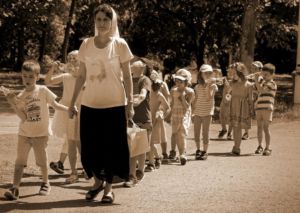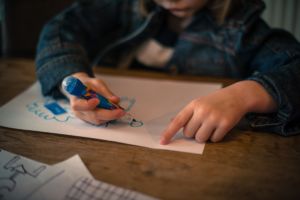
Pink tinted tiles stretched out ahead as my saddle shoes clickity-clacked down the long corridor. I passed crisscross windows papered with coffee filter snowflakes. Melting boots stood like solders outside each classroom, the sizes getting smaller and smaller as I passed, and construction paper snowmen danced their way down the hallway. Hendry Park Elementary looked a lot like my old school. Same hallways, same art projects, and that familiar feeling of failure surrounded me as my feet dragged down the hallway behind my mother.
It was my second first-day of kindergarten, halfway through the 1977/78 year. Gray skies matched my somber mood as my mother walked me to my new class, Room 2. Three weeks earlier, my family had moved to a rickety old house on the edge of town and started a new family business. I’d finished out the first semester at my old school and today was my first day at my new.
My sweaty palm clutched my mother’s as we got closer to Room 2. I was nervous. Nervous about talking in front of my new teacher and classmates, nervous about their seeing my screwy cutting and coloring, and nervous about everyone finding out I wasn’t a good girl. Mostly, I was nervous about the folded, sealed, and labeled letter tucked down the side of my supply bag with the words, “For Celena’s New Teacher” written neatly on the outside in Mrs. Vayour’s perfect script. I had no idea what was in that note, but I knew I didn’t want my new teacher (or anyone for that matter) to read what was inside.
Mrs. Vayour was convinced I wasn’t ready for first grade and she enjoyed reminding me of it often during class. She would snicker at my mispronunciations, comment on my less-than-stellar cutting and coloring, and constantly comment on my shortcomings in front of classmates. She often commented that I was a lot different than Charlotte (my older, smarter, faster, straight-line coloring sister). She was right. I wasn’t Charlotte, and I was a mess of a young girl – a stuttering, speech impaired, clumsy little flibbertigibbet of a human.
My mom decided to take a day off and take me to meet my new teacher. This was a big deal. My mother and father never took days off. But she had dealt with my crying and reluctance to leave the house every morning since September, so she made time.
The closer I got to Room 2, the louder the music. And this was not the canned, tinny sound of record player playing music, but the rocking and rolling music of a live piano, just like the music Ricky Landers’ (the piano player in my dad’s band) played. By the time I reached the door, the room was shaking with the beat of music. When I looked inside I saw boys and girls standing in a wide and uneven circle. Hands on hips, heads bobbing, each one with an arm stretched long and low, waiting for someone to come around and “slap five.”
I didn’t see a teacher anywhere, just the back of an upright piano with the back off, wires and chords jumping as they were struck by tiny hammers, and I saw a pair of feet – one tapping and one pumping pedals – under the piano. As the boys and girls put their arms down and turned to stare toward the doorway, the music mellowed and the feet moved to stand. A face popped over the top of the piano. This was my first look at Rose Clark, my new kindergarten teacher.
“Hello,” she sang as she walked over to the door, leaned down, took my hand and introduced herself. “Celena, we’ve been waiting for you to get here all morning. Everybody’s excited because we have two new students joining our class. Phuong is already here.”
She briefly turned her attention to my mom, shook hands and asked how the old house was coming along. They spoke for a minute and I half-listened while I studied this new teacher. She was round – round-faced and round-bodied with sparkly beads around her neck and pink tinted horn-rimmed glasses halfway down her nose. She wore a red polyester pantsuit and shoes with square heels. Her hair looked soft, grayish-blue and curly. Beautiful.

I watched as my mom handed Mrs. Clark the paper bag with the note inside. The note that would doom me. I heard her explain to Mrs. Clark about the letter from Mrs. Vayour and my troubles. Mrs. Clark thanked her, dropped the bag on floor beside the fish tank, then she dismissed my mom in her friendly, but firm fashion, “We’ll see you at 10:45 out front. A lot of moms like to wait on the bricks until the students come out rather than come in – sometimes we aren’t ready to go right at 10:45. See you then.”
She squeezed my hand and I turned to face my new classmates, staring at me. I took a deep breath and waited for Mrs. Clark to make me introduce myself. I warmed my tongue up inside my mouth and willed my name to come out clear – “Celena” and I knew I’d never be able to do it. The closest I ever got was a soft and “Fuweenaw” and I was prepared for the giggles, prepared for Mrs. Clark to look down her nose, grab my chin and start whipping my lazy tongue into shape, in front of everyone.
Turning toward the kids, Mrs. Clark announced, “Class, this is Celena, and it might be a tricky name for some of you to say. We have two new students and I know some of you might have a hard time remembering their names, but we’ll get them by end of the day. Now, back to work!”
Dropping my hand she planted me firmly between Phuong and Jenny Schmieling, moved back behind the piano, and started up the music. WHAT? No chin grabbing? No peering into my mouth? No declaring that my tongue was the laziest, most good for nothingest tongue she’d ever seen? Nope. Nothing. It was a non-issue. And that was the end of that. Really.
Hurtful words like ‘lazy,’ ‘behind,’ ‘not ready for’ weren’t words I heard, so I didn’t listen for or think about them anymore.
We proceeded to play the skipping game. The object of the game was for one child to skip around the circle 2 times, slap five to one of the outstretched hands around the circle, grab it and skip two more times with their partner, then return to their spot and wait for another turn. It was so fun. As I played, I soon found out there were a couple (but not many) skippers, there were gallopers (like me), trippity-trappers, hoppers, jumpers, and just plain old walkers. Phuong, on her turn, grabbed my hand. We laughed and hopped, saying words to each other that neither of us spoke and we both understood. Everyone had a turn.
And as for the note? I never saw that bag again. My table box was filled with fresh crayons, scissors, a new name plaque that I got to write and decorate myself. The brown paper bag must have been pitched, along with my worn-out supplies. I didn’t think about that bag or note again until long after my school days were over as a student, and I started my school days as a teacher.
I know, I’m positive, Mrs. Clark read the letter. I know she knew about the problems I was having academically, emotionally, physically and socially. I know she couldn’t understand most of what I said, but I never heard a “What?” or “Say it again” or anything. My jagged cut construction paper spring tulips hung up proudly beside the better-trimmed stems. My circle-colored pictures had stickers and smiles attached to the top as they went into my mailbox and home. The games Mrs. Clark had me play, the centers she had me stationed, the poems and songs she had me singing and chanting, all worked together to straighten out my shortcomings. Hurtful words like “lazy,” “behind,” “not ready for” weren’t words I heard, so I didn’t listen for or think about them anymore.
We were learners. We celebrated our learning. We celebrated ourselves.
As I reflect on this memory, and think about my new school year ahead, I’m overcome with understanding for what genius was behind those horn-rimmed glasses. For example, the first time I played the skipping game hardly anybody did the skipping part, but by the end of the year, we could all do the complicated two-foot skip, which was one of the motor skills we were assessed on at the end of the year. Not to mention, Phuong and I had lots of conversations those next few months as we traveled to and from language services and had double doses of theater centers to play-act our favorite books, poems, and songs. We also had lots of opportunities to cut (without any dotted lines!), color (pictures we drew ourselves – no prefab pictures from books!), read books, write stories ourselves (my first ones were filled with all sorts of mixed up letters and squiggles but by the end I had labels and simple sentences) and display our work proudly among the other students in our class, no matter how it looked. We were learners. We celebrated our learning. We celebrated ourselves.
I write this moment as a quick moment because it was just that: quick and instant. From that moment I belonged in kindergarten with my kindergarten friends and after that I would go to first grade with my class and so on. I’m sure I still struggled. I’m sure my classmates had to ask me to repeat myself when I would speak to them. I’m sure they noticed my projects weren’t as neat and tidy as others, but I don’t remember because there was never any attention drawn to my less-than-standard work. I know my art projects and take-home papers had more mistakes than others, but it was never an issue as everyone’s work was validated and celebrated. Because I was not identified as a struggler, I ever identified as struggling.
Because I was not identified as a struggler, I ever identified as struggling.
Mrs. Rose Clark was ahead of her time. Already into her middle sixties by the time I entered her A.M. kindergarten class that January of 1978, she was everything a teacher should be. She loved to laugh, sing, play piano, and really knew how to rock a polyester pants suit. She wasn’t perfect, but she was absolutely perfect to me. What every kindergarten teacher was supposed to look like, smell like, and sound like, according to my five-year-old laws. Mrs. Clark loved good students. She loved smart students. She loved not-so-smart students. She loved students with lazy tongues and crooked cutting left hands. She loved kids. She loved teaching.
Now I’m 49 and entering classrooms for the first time again in a few days. So much of my teaching is an extension of Rose Clark and the work she did with me as a five-year-old. Words can’t explain how much of what I do is because of my experiences with Mrs. Clark. She changed my life. It’s a new year and I’m my old teaching self. But this year, especially this year, I am entering the classrooms I am lucky enough to be part of with my own rose-colored horn-rimmed reading glasses, looking for the magic inside each of the students I meet.

